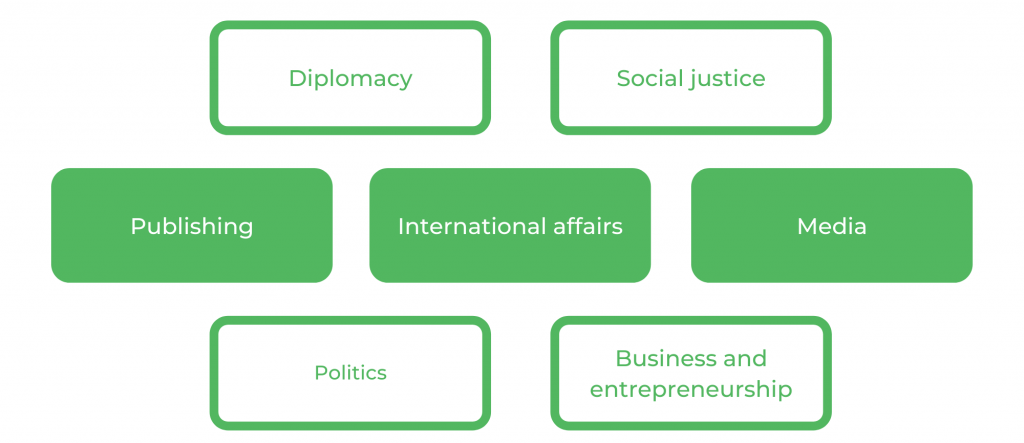So you’ve got all the info about studying a Bachelor of Arts UNSW. That’s all well and good, but now you want to get your hands on the nitty-gritty, behind-the-scenes details.
We get it — it’s important to understand the hard facts about studying at a university, but sometimes you just want someone to tell it to you straight.
We sat down to have a chat with our friend Lindsay so that we could do exactly that. Lindsay graduated from UNSW’s Bachelor of Arts program in 2019, which now makes her a UNSW Arts expert.
Let’s see what she had to say!
Why should you study an Arts degree at UNSW?
Top 3 Pros of an Arts Degree
Top 3 Cons of an Arts Degree
Mistakes You Shouldn’t Make
Things to Know Before Starting UNSW Arts
What Makes this Degree Different
Motivations for Studying UNSW Arts
Potential Career Paths
Why should you study a Bachelor of Arts at UNSW?
Well we definitely couldn’t have said it better ourselves. Studying an Arts degree at UNSW will teach you to read between the lines and question everything.
It’s definitely a lot less specialised than a Science or Engineering degree, but critical thinking skills are the bread and butter of the world’s most influential people. Being able to critically engage with any topic you’re faced with is definitely not a skill to turn your nose up at — it’s a skill that will invariably open up a lot of doors in life.
UNSW’s Arts program is also extremely varied with 26 different majors, so it can basically be anything you want it to be. If it’s Social-Science related, you can do it!
Top 3 Pros of an Arts degree
#1: It’s super flexible
This is probably the trademark feature of any Bachelor of Arts degree, and UNSW is no different. A Bachelor of Arts is essentially the most generalised form of an undergraduate degree.
It may not have all the bells and whistles of some other programs, but it gives you the freedom to choose exactly how you want to structure the degree. And, you can always add the bells and whistles (Honours and Masters) later if you feel the urge.
“I majored in French and International Relations, but I also had the freedom to explore Economics and English. In a way, my degree wasn’t only limited to my Majors, I was able to meld it to my needs. Now I have a better foundation to adapt than my peers with more streamlined degrees,” explains Lindsay. Not everyone knows what they want to do straight out of uni, so it’s nice not to have the extra pressure to stick to one thing.
You can easily switch your major half way through the degree without wasting any time for your graduation. Plus, you have 26 amazing majors to choose from!
#2: Amazing lecturers
Social Science programs require much less textbook learning than other more integrated fields, like IT or Science. This basically means that the quality of the teaching is almost 100% dependent on the lecturers themselves. “There were so many lecturers whose passion for their field of study and body of work was really infectious, if not inspiring,” says Lindsay.
Sometimes a lecturer could be the thing between you and choosing your major — they can have a really big influence on your relationship with your studies. A degree can only really be as good as the teacher.
UNSW Arts and Social Science lecturers are extremely respected and published in their field; UNSW ranks 42nd in the world for Humanities after all. “William Clapton and Nicholas Apoifis [UNSW lecturers] are not only impressive academics, they’re also really adept story tellers. there’s never a boring moment in their classes,” recalls Lindsay.
#3: It will change the way you think
A large majority of Social Science assessments are based on your ability to read between the lines and deconstruct a thesis (or multiple theses). In order to critically engage with these texts, you need to think outside the box. There is no right or wrong answer in Social Sciences, what’s important is your ability to prove your opinion and then quantifiably explain why you’re correct.
“Sometimes after class I would catch myself deconstructing the most basic social concept while on the train. I started to realise that things I had always considered fact were not 100% true — everything is influenced by, and relates back to, a range of societal constructs,” says Lindsay.
You’ll find that even after you graduate, you won’t stop thinking like this. Studying a Bachelor of Arts at UNSW makes you inherently more analytical; you really will start to question everything.
Top 3 Cons of an Arts degree
#1: There’s no practical component
It’s no secret that a Bachelor of Arts is not the most practical of degrees out there. It’s very analytical and research-based, which doesn’t really leave room for a prescribed internship program.
According to Lindsay, “Internships are not a part of the program’s DNA — it doesn’t mean you can’t do one, but you definitely won’t be encouraged to, and you won’t be given the resources to either.”
Without any internship experience after a Bachelor of Arts at UNSW, you won’t exactly feel ready to jump straight into the workplace. Not being work ready, in some ways, can seem a little bit unproductive. I mean, why else are you even getting a degree?
At the end of the day, you’ll most likely have to find an internship yourself during or after your degree.
#2: There’s a lot of reading
“Sometimes when I would look at my reading schedule, I would just be like, there’s no way,” woefully remembers Lindsay. Most subjects will prescribe 2 to 3 readings per week.
With each reading being around 20-40 pages long, you’ll need to read somewhere around 100 pages per week — and that’s just for one subject. If you’re taking 3 subjects, you’ll basically be reading the equivalent of a novel per week.
On top of lectures, tutorials and assessments, it can be a little hard to fit in all of those readings, especially if you have a part-time job on the side. To make matters worse, the topics of these readings are not exactly what you would call easy to understand. It’s an up-hill battle for sure.
#3: It’s (too) flexible
I know we said that this was a pro, but some things can be both a blessing and a curse. Because there’s no real structure to the degree, you might feel a little bit lost. It’s nice to have freedom but sometimes a little guidance can make a huge difference.
“At times I didn’t really know whether I needed to be taking this subject or that subject, and it all got a little confusing,” explains Lindsay. The only thing that’s certain in an Arts degree is that you need a major — everything else is a little unclear. You might have trouble figuring what you should be doing and at times it might feel like you’ve made a wrong decision by taking a certain course.
Any regrets?
“I was lucky that I fell into a series of great job opportunities throughout my degree, so the post-grad job hunt was no stress. I would say the number one regret I see is totally apart from the degree or subject choices, or the length (read: delay) it took to finish — it was all about ‘I wish I worked more’. The major asset Arts students have over other disciplines is flexibility, and you have to make the most of that,” she explains.
You really have the freedom to make your Arts degree into whatever you want it to be, so if you choose to pursue UNSW Arts, use that freedom wisely!
What do you wish you had known before starting UNSW Arts?
“I guess I wish I knew from the beginning that it’s important to make the most of your time at university. There’s always this pressure that you’re not doing enough, but by the time you finish your degree you realise that it doesn’t actually make a huge difference. Before you know it, your time at university is done. Don’t waste your time comparing yourself to others. It’s your degree and how you choose to shape it is your decision,” recommends Lindsay.
Your university experience is solely your own, so don’t feel pressured to take on subjects just because someone else says you should. Do what feels right for yourself!
What makes this degree different from the ones offered at other universities?
Great Exchange options
UNSW has some of the best exchange partners of any Australian university. They have 200 partners in 38 different countries!
Considering how flexible a Bachelor of Arts is at UNSW, it’s not difficult to find transferable credits for your university overseas either. This basically means that Arts students are pretty much free to go to university overseas for a semester.
“I personally spent a Semester in Canada. It was a great way to see a different perspective of global politics, and it was also just a really good excuse to go overseas,” says Lindsay.
What inspired you to choose UNSW Arts?
“I view Arts degrees as a springboard into a pretty open-plan life. Tertiary education in general has started to become a bit of a check box, but it’s important to remember that as an institution it should excite you and should be viewed as a place where you can explore the world. That’s how I approached it, which is why my undergrad covered English, Economics, French and Politics. I honestly feel so confident as a result that I’m equipped to, as the Australian adage/maxim would say, ‘have a go’,” says Lindsay.
What are the possible career paths?
“Literally anything. Hate to be this person but it’s up to you to make what you’ve been given work. If you have the rigour and drive to make an Arts degree work for you, you’ll find that you’re one of the more versatile candidates in the market,” says Lindsay.
In saying that, here are some common paths that Arts graduates might take:
-
- Diplomacy
- Social justice
- Publishing
- International affairs
- Media
- Politics
- Business and entrepreneurship
Cody Williams is a Content Writer at Art of Smart Education. While Cody studied a Bachelor of Arts in International Relations and French Studies at UNSW, he quickly realised that his dream job would have him sit happily behind a keyboard. Cody’s digital writing career started with an internship at Bauer Media where he was writing for ELLE and Harper’s BAZAAR’s online publications. Once he had a taste for writing he never looked back, moving to Brisbane soon later to work as a Producer for Channel Nine Queensland. After a year in television media, he dusted off his online writing shoes so he could put them to good use, stamping out some scorching-hot career and educational resources at AOS.





